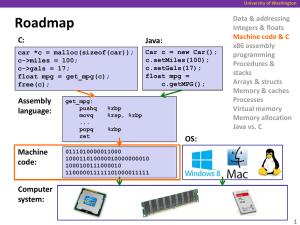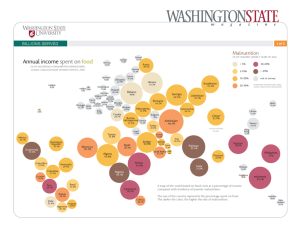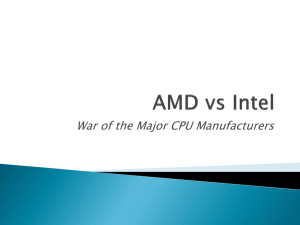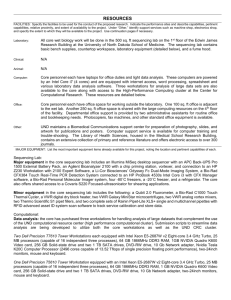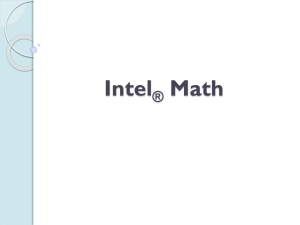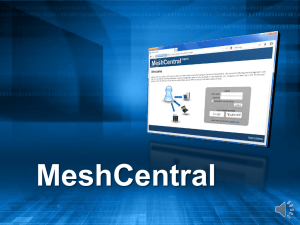Lec0-intro - ECE Users Pages - Georgia Institute of Technology
advertisement
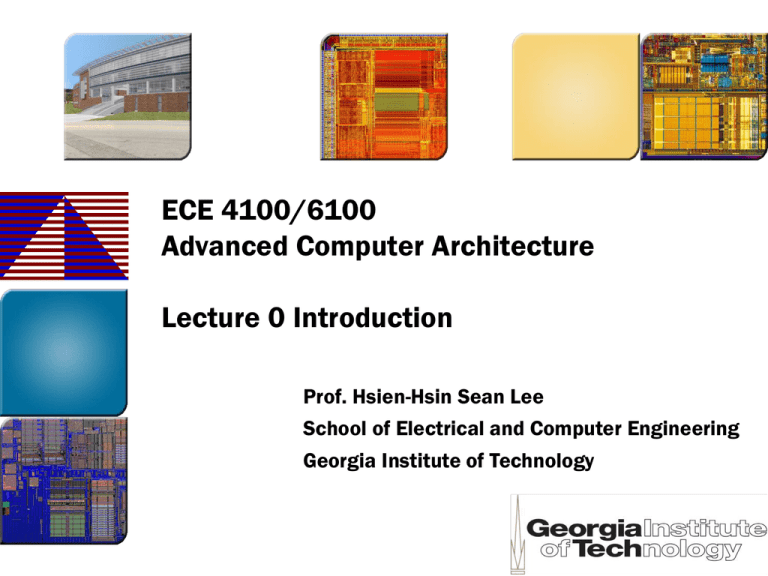
ECE 4100/6100 Advanced Computer Architecture Lecture 0 Introduction Prof. Hsien-Hsin Sean Lee School of Electrical and Computer Engineering Georgia Institute of Technology Course Information • Instructor: Hsien-Hsin Sean Lee (leehs@gatech.edu) • Office: TBD • Online resources: – www.ece.gatech.edu/~leehs/ECE6100 – Constantly updated, check it out regularly – www.tsquare.gatech.edu • Prerequisite: ECE3055 Computer Organization and Operating System or the equivalent. Pre-requisite • Textbook – Hennessy and Patterson, Computer Architecture: A Quantitative Approach (4th edition), Morgan Kaufmann, 2006. – (Recommended) Jean-Loup Baer, Microprocessor Architecture -- From Simple Pipelines to Chip Multiprocessors. Cambridge Univ. Press, 2009. • Other teaching materials – Key papers available later in class meetings and course web – Slides & Lectures Textbook 2 Course Scope To Learn • • • • • • • • • • • Core concept of modern microprocessor architecture ISA, performance Instruction-Level parallelism Branch prediction and Front-end fetch Dynamic HW Scheduling Techniques Memory Hierarchy Multiprocessors, SMT, Multi-core, Many-core Cache Coherence and Memory Consistency Models Case studies of Commercial Microprocessors VLIW, EPIC, Static Scheduling Physical design, emerging trend, technology integration (if time allowed) 3 This course requires a lot of time commitment 4 BY THE WAY This is not really an “Advanced” Computer Architecture class per se 5 Grading • 4 Programming Assignments: 60% – Individual work, no collaboration – TA’s check-off required – Could cause panicking, heartburn, dizziness, etc. • Exams – One in-class exams: 15% – One final exam: 25% 6 Stack of A Computing Problem Problems Apps Trend Algorithms Programming Languages Compilers ISA System Architecture Implementation MicroArchitecture Architects’ Territory Logic and Circuits Transistors Manufacturing Technology Trend 7 Moore’s Law (a.k.a. Intel’s Roadmap) 90 nm 596 mm2 65 nm 698 mm2 1.7 billions Montecito 2 billions Tukwila 3 billions Nvidia Fermi @40nm 10 μm 13.5mm2 42millions Exponential growth 3.9 billions Altera Stratix FPGA @28nm 2,250 Source: Intel Corp. 8 Feature Size Feature size shrinks by 70% per 18 to 24 months 9 Feature Size (More Recent) 10 Transistor Cost 11 Power Density Trend P CVdd f Vdd I st Vdd Ileak 2 Source: Intel Corp. 12 Google Server Farms (Oregon) 13 Heat Dissipation Pure copper Cooler jet Cooligy’s channel 3D Cooler Pro Source: K. Skadron Cooking-Aware (or Colwell’s Charcoal-aware) Computing PS3 Grill (http://www.therealps2grill.com 14 Watch this Click the chip 15 Focus on Computer Architecture software instruction set hardware Technology Programming Languages Applications Computer Architecture Operating Systems Virtualization History (A = F / M) 16 Instruction Sets High Performance Servers X86, Itanium, Sparc, Alpha x86 Desktop, Notebook PC x86 PPC Embedded Processors Market Segments Atom ARM MIPS SH Present 17 Constantly Changing Definition • 50s to 60s: Computer Architecture ~ Computer Arithmetic • 70s to mid 80s: Instruction Set Design, especially ISA appropriate for compilers • 90s: Speculation: Predict this, predict that; memory system; I/O system; Multiprocessors; Networks • 2000s: Power efficiency , Communication, On-die Interconnection Network, Multi-this, Multi-that. (We are here) • 2015 and beyond: Thousand-core processors, Self adapting systems? Self organizing structures? DNA Systems/Quantum Computing? 18 Job Description of a Computer Architect • Used to be “Performance, performance, performance” • Make trade-off of performance, complexity effectiveness, power, technology, cost, etc. New Fads • Availability – Where you store your photos, emails and shared docs today? – Cloud computing • Reliability – Toyota blamed soft errors for the sudden acceleration problem • Security – Intel acquired McAfee • Power management – It is about money ! 19 Job Description of a Computer Architect Understand application requirements – – – – General purpose Desktop (Intel, AMD) Game and multimedia (STI’s Cell, Nvidia, Wii, Xbox 360) Embedded and real-time (ARM, Atom, MIPS) Online transactional processing (OLTP), data warehouse servers (Sun Fire T2000 (UltraSparc T1), IBM POWER (p690), Google Cluster) – Scientific (finite element analysis, protein folding, weather forecast, defense related (DE Shaw Anton, IBM BlueGene, Cray T3D/T3E, IBM SP2) – Sometimes, there is no boundary … 20
